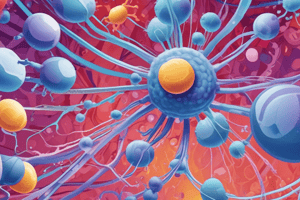Podcast
Questions and Answers
What leads to the transformation of normal cells into tumor cells?
What leads to the transformation of normal cells into tumor cells?
Dysregulated cell growth and proliferation lead to the transformation of normal cells into tumor cells.
How do tumor-specific transplantation antigens (TSTAs) differ from tumor-associated transplantation antigens (TATAs)?
How do tumor-specific transplantation antigens (TSTAs) differ from tumor-associated transplantation antigens (TATAs)?
TSTAs are expressed only on tumor cells, while TATAs are expressed on both tumor and normal cells.
What role do natural killer (NK) cells play in the immune surveillance of tumors?
What role do natural killer (NK) cells play in the immune surveillance of tumors?
NK cells kill tumor cells, especially those with reduced class I MHC expression, aiding in immune surveillance.
What intrinsic factors can cause dysregulated cell growth leading to cancer?
What intrinsic factors can cause dysregulated cell growth leading to cancer?
How do cytokines like TNF-α contribute to tumor immunity?
How do cytokines like TNF-α contribute to tumor immunity?
What is the impact of interferons (IFNs) on tumor cells?
What is the impact of interferons (IFNs) on tumor cells?
What is immune evasion in the context of cancer?
What is immune evasion in the context of cancer?
What external factors contribute to the development of cancer?
What external factors contribute to the development of cancer?
How do antibodies contribute to tumor growth in the context of immune evasion?
How do antibodies contribute to tumor growth in the context of immune evasion?
What is the role of CTLs in the adaptive immune response against tumors?
What is the role of CTLs in the adaptive immune response against tumors?
Describe how tumor cells can modulate MHC I expression as a mechanism of immune evasion.
Describe how tumor cells can modulate MHC I expression as a mechanism of immune evasion.
What are the potential benefits of cancer immunotherapy?
What are the potential benefits of cancer immunotherapy?
How may antibody modulation affect tumor antigen expression?
How may antibody modulation affect tumor antigen expression?
What role do innate immune responses, such as NK cells, play in tumor suppression?
What role do innate immune responses, such as NK cells, play in tumor suppression?
In what ways are cancer vaccines being investigated in cancer treatment?
In what ways are cancer vaccines being investigated in cancer treatment?
What challenges are associated with the use of monoclonal antibodies in cancer therapy?
What challenges are associated with the use of monoclonal antibodies in cancer therapy?
Flashcards
Cancer
Cancer
A disease caused by uncontrolled cell growth and division
Immune Surveillance
Immune Surveillance
The immune system's role in detecting and destroying abnormal cells, including cancerous cells.
Immune Evasion
Immune Evasion
Cancer cells' ability to avoid detection and destruction by the immune system.
Tumor Antigens (TSTAs)
Tumor Antigens (TSTAs)
Signup and view all the flashcards
Tumor Antigens (TATAs)
Tumor Antigens (TATAs)
Signup and view all the flashcards
NK Cells
NK Cells
Signup and view all the flashcards
Cytokines
Cytokines
Signup and view all the flashcards
Cancer Immunotherapy
Cancer Immunotherapy
Signup and view all the flashcards
Antibody enhancement of tumor growth
Antibody enhancement of tumor growth
Signup and view all the flashcards
Antibody modulation of tumor antigen
Antibody modulation of tumor antigen
Signup and view all the flashcards
Modulation of MHC I expression
Modulation of MHC I expression
Signup and view all the flashcards
Cytokine therapy
Cytokine therapy
Signup and view all the flashcards
Monoclonal antibodies
Monoclonal antibodies
Signup and view all the flashcards
Cancer vaccines
Cancer vaccines
Signup and view all the flashcards
Immune evasion by tumor cells
Immune evasion by tumor cells
Signup and view all the flashcards
Study Notes
Cancer Overview
- Cancer cells exhibit uncontrolled cell growth, invading healthy tissue.
- Genetic mutations, radiation, viruses, and bacteria are causes of dysregulated cell growth and proliferation.
Immune Surveillance
- Innate immune responses target tumors, including NK cell killing and macrophage production of antitumor cytokines.
Immune Evasion
- Tumor cells may mask antigens or downregulate MHC expression to evade immune responses.
Cancer Immunotherapy
- Designed to enhance immune response against cancer cells.
- Cytokines and monoclonal antibodies are used in treatment, though efficacy is limited.
- Vaccines may prevent tumor development or recurrence.
Tumor Antigens
- Tumor-specific transplantation antigens are unique to tumors.
- Tumor-associated transplantation antigens are normal cellular proteins, aberranlty expressed in tumors.
Studying That Suits You
Use AI to generate personalized quizzes and flashcards to suit your learning preferences.




